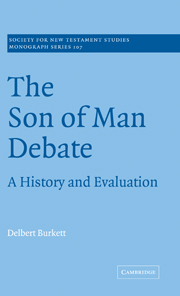Book contents
- Frontmatter
- Contents
- Preface
- List of abbreviations
- Introduction
- 1 Genealogical interpretations
- 2 The human Son of Man
- 3 The apocalyptic/messianic Son of Man
- 4 The question of reference
- 5 The question of authenticity
- 6 Miscellaneous sons of men
- 7 Exit the apocalyptic Son of Man?
- 8 The idiomatic/nontitular son of man
- 9 Son of Man in apocalyptic and rabbinic texts
- 10 Conclusions
- Appendix Surveys of research on “the Son of Man”
- List of references
- Index of passages
- Index of authors
- Index of subjects
4 - The question of reference
Published online by Cambridge University Press: 15 October 2009
- Frontmatter
- Contents
- Preface
- List of abbreviations
- Introduction
- 1 Genealogical interpretations
- 2 The human Son of Man
- 3 The apocalyptic/messianic Son of Man
- 4 The question of reference
- 5 The question of authenticity
- 6 Miscellaneous sons of men
- 7 Exit the apocalyptic Son of Man?
- 8 The idiomatic/nontitular son of man
- 9 Son of Man in apocalyptic and rabbinic texts
- 10 Conclusions
- Appendix Surveys of research on “the Son of Man”
- List of references
- Index of passages
- Index of authors
- Index of subjects
Summary
If Jesus used the expression “Son of Man,” to whom did he refer? The question arises from the fact that in all the Son of Man sayings, Jesus speaks of the Son of Man in the third person, as if referring to someone else, though in most cases the context makes clear that he is speaking of himself. This oddity has given rise to five main interpretations that seek to account for it. (1) Jesus habitually referred to himself in the third person with a title. (2) Jesus referred to himself not with a title, but with an Aramaic idiom by which one could refer to oneself in the third person. Later the church misinterpreted the idiom as a messianic title. (3) Jesus referred not solely to himself, but to a collective or corporate entity which included himself. Later the church misinterpreted the collective reference as a reference to Jesus alone. (4) Jesus referred not to himself, but to another messianic figure distinct from himself. Later the church applied the messianic title to Jesus. (5) Jesus did not speak about himself in the third person, but the early church did. References to the Son of Man in the third person reflect the language of the church speaking about Jesus.
Son of Man as a titular self-designation
The Evangelists leave the impression that Jesus regularly spoke about himself in the third person with a christological title, “the Son of Man.” This portrayal was never questioned or explained by interpreters in the pre-critical period. Even now, many accept it as historically accurate without explaining it. Those who have tried to explain such a self-referring title have interpreted it as cryptic, idiomatic, proleptic, or borrowed.
- Type
- Chapter
- Information
- The Son of Man DebateA History and Evaluation, pp. 32 - 42Publisher: Cambridge University PressPrint publication year: 2000



